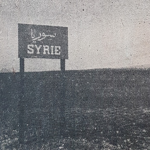The CCDP and the University of Neuchâtel have the pleasure of inviting you to the second of a series of joint events showcasing the findings of the ERC consolidator grant:
The project, begun in 2017, is led by Prof. Jordi Tejel, Adjunct Professor with the Department of History at the University of Neuchâtel and CCDP Research Associate.
This second online panel discussion will feature a presentation by Dr. Ramazan Hakkı Öztan, Boğaziçi University on “The Turkish-Syrian Border: The Making of a Post-Ottoman Illicit Zone”, as well as a presentation from Dr. Pınar Şenoğuz, University of Göttingen on "From Smugglers to Entrepreneurs: Sugar Trade and 'Fictitious' Exports at the Turkish-Syrian Border".
Prof. Keith Krause, CCDP Director, will be chairing the event, and the event discussants are Augusta Nannerini, and Bilal Salayme both from the Graduate Institute, Geneva.
Picture: Copyrights University of Neuchâtel https://www.unine.ch/border/
About the Speakers:
Dr. Ramazan Hakký Öztan completed his PhD in May 2016 under the supervision of Peter Sluglett at the University of Utah. He was a postdoctoral researcher at the University of Neuchâtel, where he worked for an ERC project led by Jordi Tejel on the borders of the interwar Middle East. He has published articles in Past and Present, International Journal of Middle East Studies, Journal of Contemporary History, and Journal of Migration History. Currently, he is working on two separate book projects: a monograph on illicit economy and violence in the late Ottoman Balkans; and a history of Turkish-Syrian border (1921–46). He currently teaches history at the Atatürk Institute for Modern Turkish History at Boðaziçi University, Istanbul.
Dr. Hatice Pinar Senoguz is currently a post-doctoral researcher at the Institute and collaborates with the Critical Migration and Border Regime Research Laboratory. She received her PhD degree from the Middle East Technical University, Turkey in 2014 with her dissertation on the social change and inner stratification in a Turkish town on the Syrian border. Currently, she conducts a research on uncertainty and homemaking among female refugees in Lower Saxony within the framework of MWK Project “Gender, Flucht, Aufnahmepolitiken. Prozesse vergeschlechtlichter In- und Exklusionen in Niedersachsen“. Among her published works, she explores shadow markets and illegality, post-migration conflicts and refugee hospitality in the south-eastern border region of Turkey.






